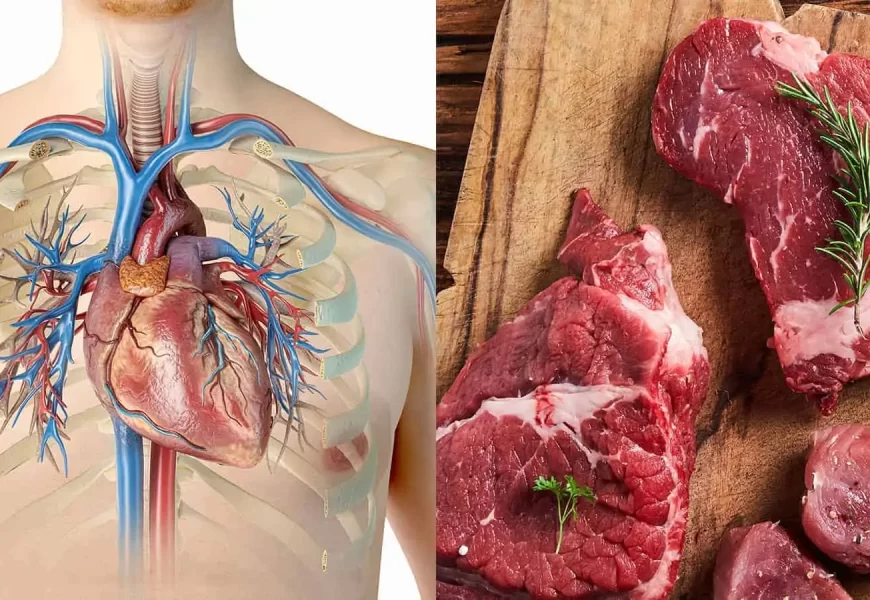Reducing meat consumption has become a growing trend, whether for health reasons, environmental concerns, or ethical choices. While meat is a good source of protein, iron, and essential vitamins, cutting back can have significant effects on your body. Some of these changes are positive, while others may require dietary adjustments to ensure proper nutrition.
So, what exactly happens when you eat less meat? Let’s explore the 20 key effects that reducing meat can have on your body, from digestion to energy levels and overall health.
1. Improved Digestion and Gut Health
Meat, especially red meat, takes longer to digest compared to plant-based foods. When you reduce meat intake, your digestive system gets a break, allowing for smoother digestion and reduced bloating. Many people report experiencing less constipation and discomfort when they eat more fiber-rich plant foods instead of heavy meat-based meals.
2. Lower Risk of Heart Disease
Red and processed meats have been linked to higher cholesterol levels and an increased risk of heart disease. Cutting back on meat, particularly fatty cuts and processed varieties, can help reduce bad cholesterol (LDL) and improve heart health. Many plant-based foods contain heart-healthy fats that support overall cardiovascular function.
3. Reduced Inflammation in the Body
Meat, especially processed meats, can contribute to chronic inflammation due to their high levels of saturated fats and preservatives. When you eat less meat and increase your intake of anti-inflammatory foods like fruits, vegetables, and whole grains, your body experiences less internal stress, leading to improved joint and immune health.
4. Weight Loss Becomes Easier
Many people notice that they lose weight when they cut back on meat, especially fatty cuts. Plant-based diets tend to be lower in calories and higher in fiber, keeping you full longer and reducing unnecessary snacking. This shift helps support healthy and sustainable weight management.
5. More Stable Blood Sugar Levels
High consumption of processed meats has been linked to insulin resistance and increased blood sugar levels. Replacing meat with plant-based proteins like lentils, beans, and tofu helps regulate blood sugar levels, reducing the risk of type 2 diabetes and stabilizing energy throughout the day.
6. Increased Energy and Less Fatigue
A diet rich in plant-based foods provides steady, long-lasting energy. Meat-heavy meals can sometimes make you feel sluggish due to their high fat and protein content, which require more energy to digest. Eating more fruits, vegetables, and whole grains supplies your body with essential vitamins and minerals that help fight fatigue.
7. Better Kidney Function
A high intake of animal protein can put strain on the kidneys, especially for those at risk of kidney disease. Cutting down on meat reduces the workload on your kidneys, allowing them to function more efficiently and lowering the risk of kidney-related health issues.
8. Lower Risk of Certain Cancers
Several studies have found that consuming high amounts of processed and red meats is linked to an increased risk of colorectal cancer and other types of cancer. When you reduce meat intake and eat more plant-based foods, you introduce more antioxidants and fiber into your diet, which help protect against cancer.
9. Stronger and Healthier Skin
Reducing meat consumption can lead to clearer, more vibrant skin. Processed and fatty meats can contribute to skin inflammation and breakouts, while plant-based foods provide essential vitamins, minerals, and hydration that support skin health. Many people notice a glow in their complexion after reducing their meat intake.
10. A Happier Gut Microbiome
Your gut is home to billions of bacteria that influence digestion, immunity, and even mental health. Eating more plant-based foods increases the diversity of beneficial gut bacteria, improving digestion and boosting overall health. Meat-heavy diets can sometimes disrupt gut bacteria balance, leading to bloating and discomfort.
11. Reduced Body Odor
Believe it or not, what you eat affects your body odor. Meat consumption, especially red meat, can cause a stronger body odor due to the way the body metabolizes animal proteins. Cutting back on meat and eating cleaner, plant-based foods can result in a fresher, more natural scent.
12. Better Hydration Levels
Plant-based foods, such as fruits and vegetables, have higher water content compared to meat. When you consume less meat and incorporate more hydrating foods into your diet, your body retains water more efficiently, leading to better skin, improved digestion, and enhanced energy levels.
13. Decreased Risk of High Blood Pressure
Many processed meats contain high levels of sodium, which can contribute to high blood pressure. By eating less meat and focusing on plant-based foods rich in potassium, such as bananas, spinach, and beans, you can naturally help regulate your blood pressure levels.
14. Increased Longevity
Several studies suggest that people who follow plant-based diets tend to live longer and healthier lives. Meat-heavy diets have been linked to various chronic diseases, while plant-based eating supports longevity by reducing inflammation, improving heart health, and maintaining stable blood sugar levels.
15. Stronger Immune System
A diet rich in vegetables, fruits, and whole grains provides essential vitamins, minerals, and antioxidants that strengthen the immune system. Meat-heavy diets can sometimes be lacking in these immunity-boosting nutrients, whereas plant-based diets provide a more balanced range of essential nutrients.
16. Possible Protein Deficiency (If Not Balanced Properly)
While cutting back on meat has many benefits, it’s essential to replace lost protein with plant-based alternatives. If you don’t consume enough protein from sources like beans, tofu, lentils, and nuts, you may experience muscle loss, fatigue, or weakness over time. Maintaining a well-balanced diet is key.
17. Better Mental Clarity and Focus
Diets high in plant-based foods have been linked to better cognitive function and mental clarity. Heavy meat consumption, especially processed varieties, can sometimes contribute to brain fog. A diet rich in fruits, vegetables, and omega-3s supports better brain function and concentration.
18. Reduced Joint Pain
Inflammatory foods, including red meat, can contribute to joint pain and stiffness. Cutting back on meat and focusing on anti-inflammatory foods like leafy greens, berries, and nuts can help reduce joint discomfort and improve mobility.
19. Improved Cholesterol Levels
Saturated fats found in meat can increase bad cholesterol levels, which contribute to heart disease. By reducing meat consumption and incorporating more plant-based foods, you can help lower LDL cholesterol and improve overall heart health.
20. A More Environmentally Friendly Diet
Reducing meat consumption doesn’t just benefit your body—it also benefits the planet. Meat production requires vast amounts of water and contributes significantly to greenhouse gas emissions. By eating less meat, you contribute to a more sustainable and eco-friendly lifestyle.
Final Thoughts
Eating less meat can lead to a wide range of health benefits, from improved digestion and heart health to increased energy and better skin. However, it’s important to replace the lost nutrients with a well-balanced diet that includes protein-rich plant foods, healthy fats, and essential vitamins to maintain optimal health.
Whether you choose to cut back on meat for health reasons, environmental concerns, or personal preference, doing so can have a positive impact on your body and overall well-being. The key is balance—ensuring that you get the nutrients you need while embracing the benefits of plant-based foods. 🌱💚




